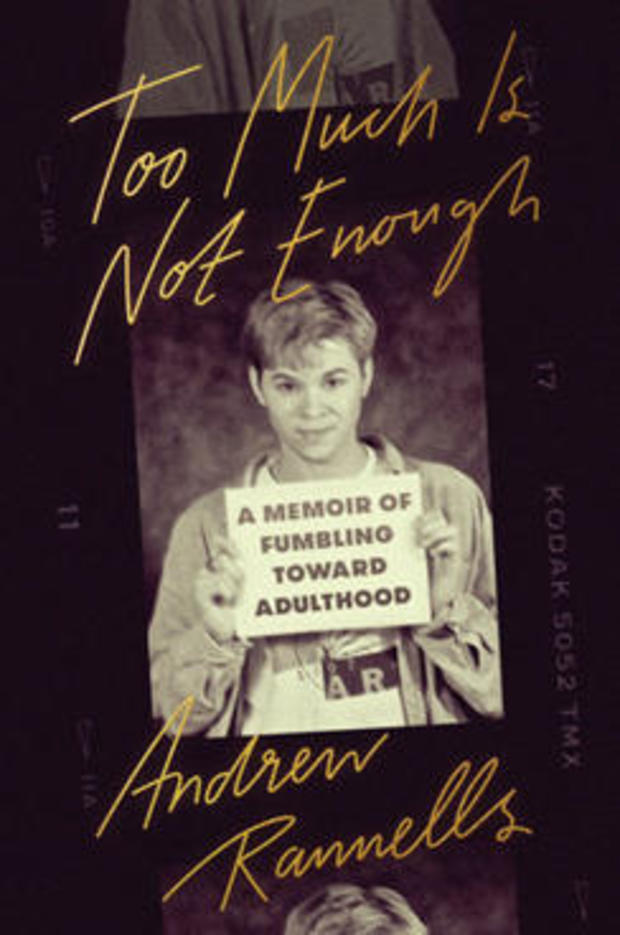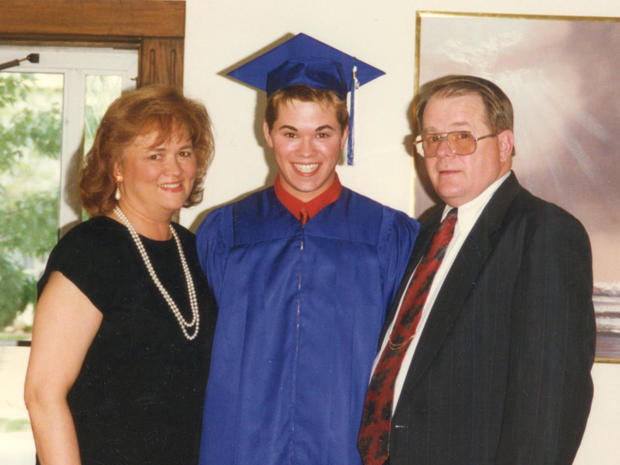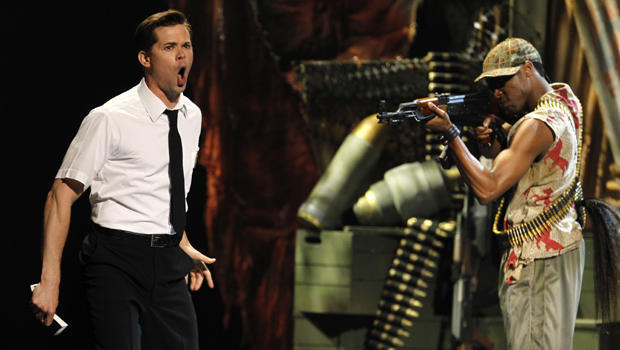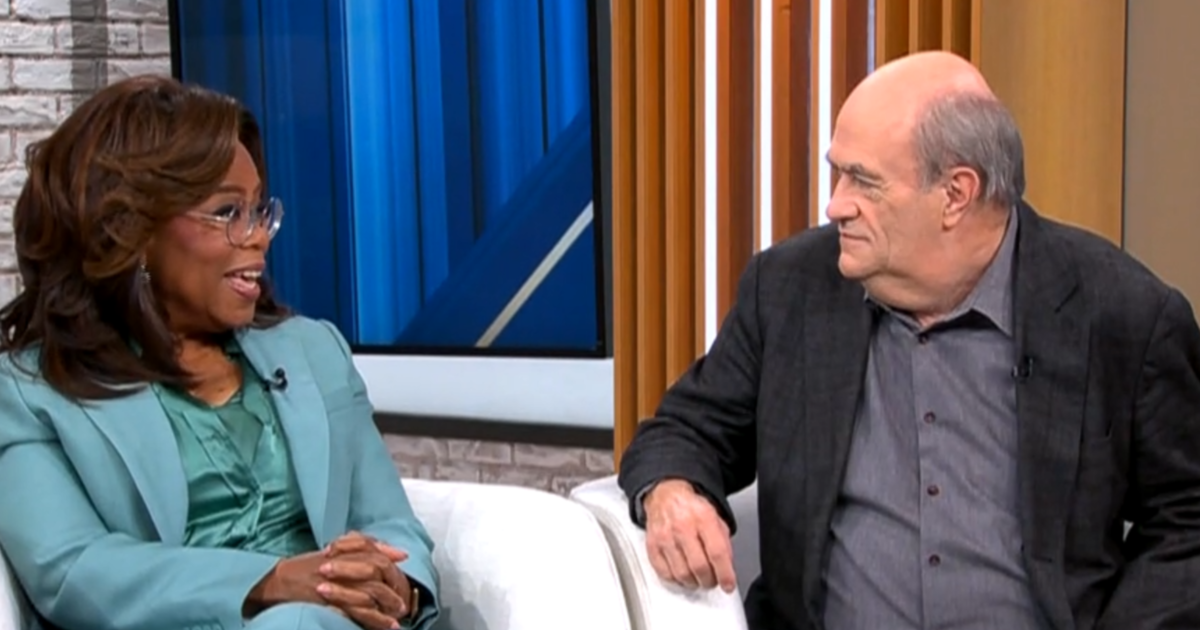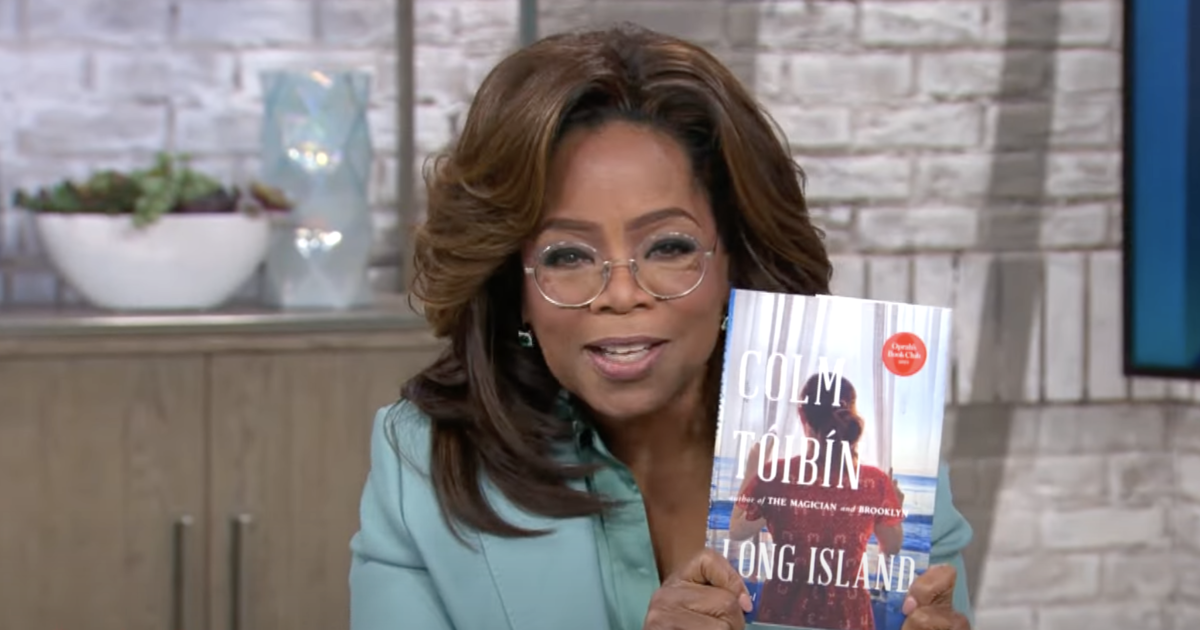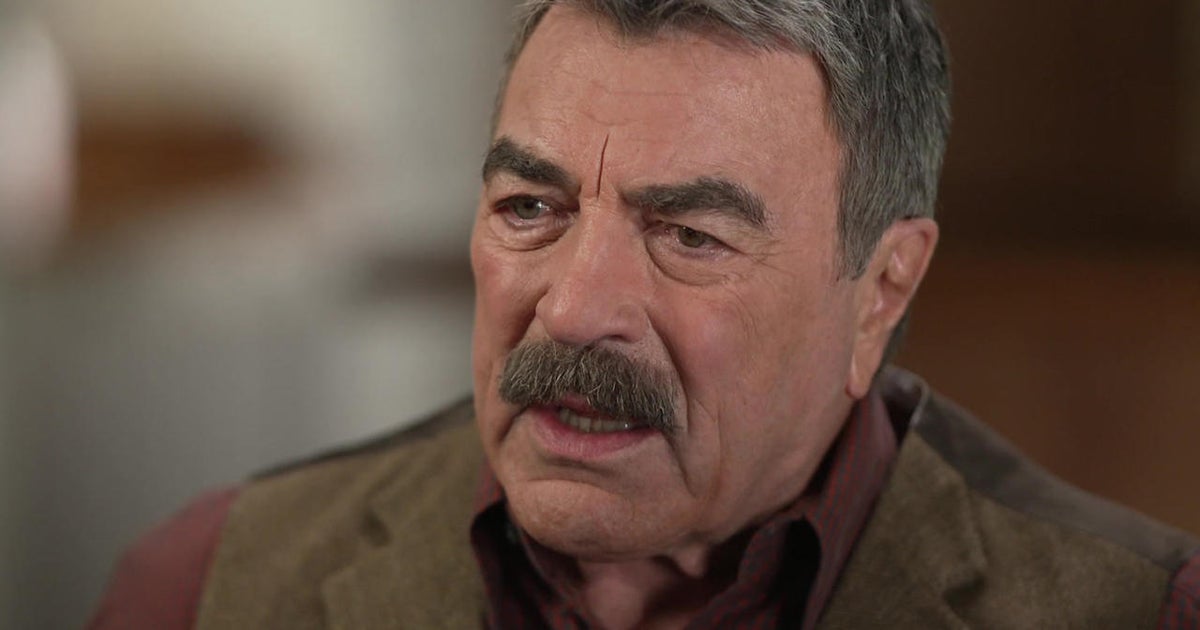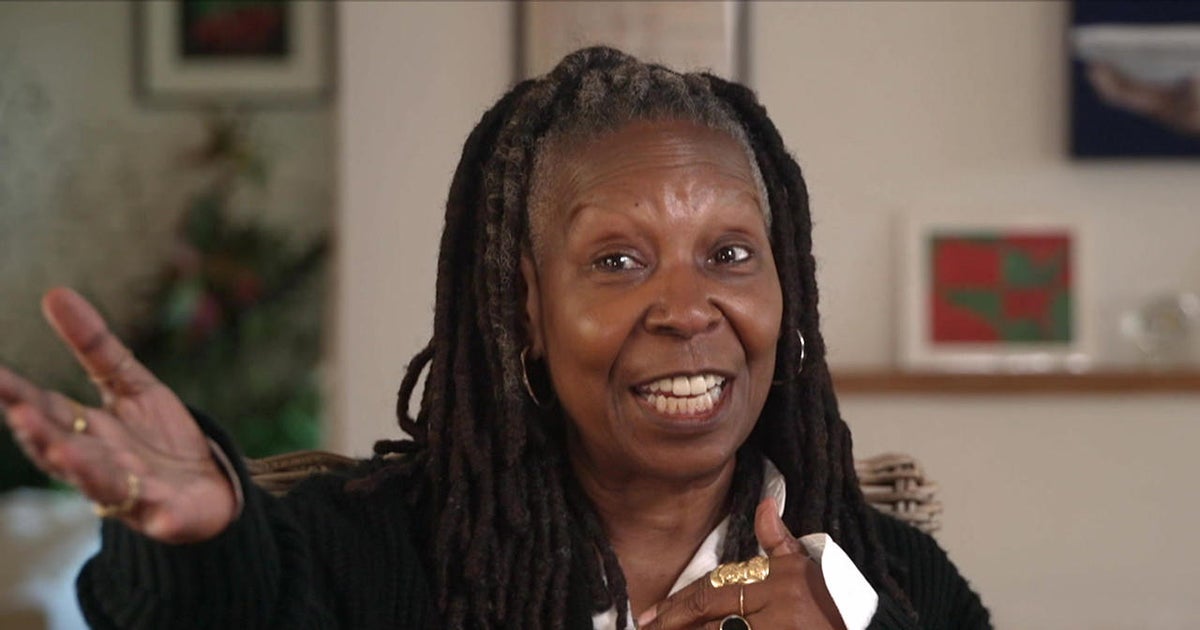Book excerpt: Andrew Rannells' "Too Much Is Not Enough"
Eight years ago Andrew Rannells starred in the hit Broadway show, "The Book of Mormon," earning him his first Tony Award nomination. It was a star-making performance that had followed years of struggle for the ambitious young actor, before he made his Broadway debut in the musical "Hairspray" at age 26. He has since appeared on stage in "Jersey Boys," "Hamilton," "Hedwig and the Angry Inch," "Falsettos" and "The Boys in the Band," and on TV in "Girls," "The New Normal" and "Black Monday."
Rannells writes about his coming from Nebraska to New York City in 1997 as a drama student in his new book, "Too Much Is Not Enough: A Memoir of Fumbling Toward Adulthood" (Crown Archtype).
Read the excerpt below – and don't miss Faith Salie's interview with Rannells on "CBS Sunday Morning" June 9!
It was August in New York, which I didn't yet know is the lousiest month of the year here. The air is thick and damp, and you constantly have the feeling that you're in a steam room fueled entirely by urine. The line for taxis at Newark Airport already seemed beaten down by the heat, and given that I wasn't even in Manhattan yet, I couldn't help but interpret the scene as some kind of warning about how hard the city was going to be. But I was here. I had taken the biggest step and I had moved to New York City. Though I had only visited a couple times in prior years, I knew this was where I belonged. I was falling in love like a kid falls in love at summer camp – quickly, completely, and with irrational passion. After nearly thirty painful minutes, my sweat-drenched parents and I piled into a cab like cattle, adding physical discomfort to the emotional awkwardness that had marked the trip so far.
I should mention here that three days before we'd left Omaha, the week I'd turned nineteen, I'd come out to my family. (I didn't think there would be an issue, but just in case, I had an exit firmly planned.) My family was mostly, what's the best way to say this? Not shocked. I knew all the words to "Grease 2" by the time I was six. I played around the house as Miss Piggy. I watched "T.J. Hooker" hoping that Adrian Zmed would be shirtless at some point. He rarely disappointed. And then there was the telltale sign: I was obsessed with "The Wizard of Oz." Even the black-and-white part. So here we were, my parents and I, three days out of the closet, jammed into the back of a cab that was swerving toward Manhattan, making us all carsick. The anxiety was thicker than the Nag Champa the cabdriver was burning on the dashboard. Neither one of my parents had come with me to look at colleges, and it was clear that they didn't want to be on this trip, either.
My father, Ron, had never set foot in New York, and he didn't seem excited about doing so now. We had never been close, and I already worried that coming out had created more of a distance between us. Now there would be a physical distance, too. I knew there would be no long phone calls sharing the drama of drama school with him, or hearing him tell me about the stresses of his advertising sales business. The chance for a relationship with him as a young adult was looking slimmer and slimmer.
My mother, Charlotte, a former teen model from Omaha, hadn't been to New York since she was a high school student in 1964. She and some other local girls from her modeling agency had been taken to Manhattan to meet talent agents, and while she had been presented with the opportunity of staying in New York, city life had proved too hectic and she had returned to Nebraska. While she always spoke romantically about her visit – the excitement of staying at the Waldorf Astoria, going to the Russian Tea Room, seeing Robert Redford in "Barefoot in the Park" – she had never returned, not until this trip.
No one in my family had gone away to college, and not only was I going away, I was going 1,249 miles away. My coming out, combined with my move, filled my mother with every fear imaginable: muggings, gay bashings, me being sex trafficked. The first time I'd gone to New York to look at schools, she had given me a roll of quarters and told me, "You can use them for vending machines or pay phones or hold them in your fist and punch someone if they try to attack you." Beyond arming me with coins as a means of self-defense, my parents had made it clear that they wouldn't be helping me with college costs or the expense of moving to New York. I can't explain to you why my parents took this stance, but in my family, college was something you paid for yourself. I had watched my two older sisters and my brother do it. They studied hard for scholarships, they worked multiple jobs, and they managed. Now it was my turn. But no one was willing to say, or perhaps no one understood, just how different, and difficult, New York City was going to be.
I had started working at a young age, doing TV commercials and local modeling jobs, and had saved a few thousand dollars over the years – enough to get started, but not nearly enough for college. So when the time came to audition for drama departments, I had no choice but to base my choices on price. I was given a full ride to Marymount Manhattan College – and was grateful for the opportunity – but I knew instantly, somewhere in my heart, that it was not the best fit. Still, while it wasn't the school of my dreams – that was NYU – it was putting me geographically closer to an even bigger dream of acting on Broadway, a dream that suddenly felt real for the first time as the lights of Times Square flashed in front of me. The cab ride through Manhattan had felt almost as long as the plane ride, but finally we pulled up at what would be my new home for this new stage of my life.
The dorm was an old building on 57th and Lexington. It's a neighborhood I know now is soulless and sad, but on that first day, it seemed terribly glamorous. The building was called the Allerton Hotel. In my head it was going to be a normal dorm experience, with common rooms and dry erase boards on the doors and clove cigarettes in the quad. We walked into the lobby and my mother gasped. It wasn't THAT bad, but it was ... bad. It wasn't so much a dorm as it was a welfare hotel with a handful of floors for Marymount students. If you live in New York or have ever visited, you know those old people you see on the street who are wearing all of their coats in summer and a Duane Reade bag as a hat? Who have a cat on a leash or a dirty dog in a stroller and are yelling to everyone and no one things like "It's coming! I'm telling you it's coming! When it happens you can remember I told you first! You f*cking whore!"? Do you know the people I am talking about? They all lived in this building. And I was going to share a bathroom and a shower with some of them. In that moment I was so self-absorbed that I could only see these people as harbingers of my potential future – a "Twilight Zone" mirror of what New York City can do to people. Now I understand that the residents at the Allerton probably weren't too pleased to have a bunch of drama students invading their home, blasting "Chess" at all hours and kick-ball-changing their way down the halls. It was not the best arrangement for anyone.
My parents were also processing our surroundings. I sensed their bodies slowing down the minute we walked into the lobby, like they were turning into stone. Or maybe they thought that if they stayed very still, we could all just pretend we weren't where we were. I, on the other hand, pretended things were going great. I marched up to the Marymount representative, announced myself, and waited for him to welcome me with open arms. He barely made eye contact, muttered "Welcome," and told me I'd be living on the twelfth floor and that the elevator was very slow, so we should probably take the stairs. Eleven flights. Two Midwestern parents. August in New York. No air-conditioning. We trudged up those stairs, stopping periodically to breathe and manage our panic. The hallways were narrow and dark, but there were several other cheerful freshmen and their parents running about. It seemed like everyone was having a better time than the Rannells family.
I was determined to turn this around. I started making jokes and talking about how exciting it all was. How much character the building had. My parents weren't playing along. We got to my room, I opened the door, and we all attempted to walk inside. It was probably eight feet by ten feet, with a low twin bed, a tiny sink, a bare bulb hanging from the ceiling, and one window that faced a darkened airshaft. My mother burst into tears.
"God damn it, Charlotte," my father said. "It's not that bad."
"Yeah, Mom, it's going to be fine."
But I knew better. All the "Rebel Without a Cause" movie posters and all the Bath & Body Works linen spray in the mall were not going to save this cell. (Since I had just come out of the closet, I hadn't yet attained the Gay Decorating Wonder Powers that I have now.)
At the time I couldn't suggest we all slam a couple drinks and then deal with what was in front of us, so I suggested we go eat instead. We walked back down the eleven flights of stairs, my mother trying not to cry, my father not speaking. "One of the best parts about New York is that no matter where you go, there are great restaurants," I said, annoying myself with my own pluck.
As it turns out, there were no restaurants at 57th and Lexington. We walked around a bit, and I started to realize that this neighborhood was not the New York of my dreams. The last time I'd visited, I'd stayed on the Upper West Side and hung out in the West Village – places that looked like the set of "Seinfeld" or "Friends." (I didn't know at the time that both shows were filmed on studio lots in Los Angeles.) This neighborhood looked like the saddest office party on the planet. Eventually we found a diner that looked acceptable. The waiter shouted at us in a manner that made us all uncomfortable, and food eventually arrived. It wasn't exactly what we ordered, but no one said anything. I worked overtime to assure my parents that this move was exactly what I'd been expecting and that I was excited and thrilled to be in New York. They seemed sad and doubtful, but they managed to smile.
After lunch we walked around a bit more, and then we found our way back to the Allerton. I asked my parents what they wanted to do that night. I imagined showing them how I could already navigate the TKTS booth or how easy it was to use the subway. My father instead said, "We are going to check into our hotel and let you get settled in. We should have breakfast tomorrow, if you have time." My mom just stood there. It was 4:30 p.m. SETTLED IN?! I thought. They had seen the room; all I had to do was open my suitcase and I was "settled in." What did they think I was going to do? "I heard one of the other parents talking about orientation, so you'll probably have to do that tonight too," my mother managed to say. "THAT IS TOMORROW AFTERNOON!" I wanted to scream. "I have nothing to do and I hate where I live and I am terrified, please do not leave me!" But instead I said, "Great. I will meet you at your hotel in the morning." Then I put them in a cab and walked back into my new home, up those eleven flights of stairs, past all the other students and parents unpacking shower caddies and tiny microwave ovens, and into my cell. I shut the door and locked it behind me. And then I cried. I cried like I had never cried in my life. This was my dream, moving to New York and starting my life as an adult, and it was horrible.
I don't know how long I cried, but it was a while. Finally, I stopped. I decided that I couldn't spend my first day in New York feeling sorry for myself. I summoned the Midwestern grit of my ancestors, the strength and spirit of Willa Cather and her prairie kin, and decided I needed to take charge of my experience. Unlike other college dorms, these cells were only meant for one person. Initially the "no roommate" detail had seemed like a plus, but now I realized that I alone was going to have to make this room acceptable. I unpacked my clothes and put them in my tiny closet. I made my bed and sprayed my eucalyptus Bath & Body Works linen spray everywhere. I arranged a few family photos I had packed, and then I sat back and took in my new home. It wasn't bad.
Just as my stress level started to decline, I heard people outside in the halls talking and laughing and yelling about extension cords, flip-flops for the shower, and Beds in a Bag (popular in 1997). I wanted to go out and say hello, but I was too embarrassed – embarrassed that I didn't have any of that fun stuff that's meant to make a dorm room livable, and that I was alone. I couldn't stay in that room any longer. F*ck it, I thought. This is New York City and I'm living here now. I marched down those stairs for the fourth time that day, looked for a pay phone, and then called the one person who I knew in the city: Celestina Villanueva.
I had met Celestina at a college scholarship audition earlier that year, and we had kept in touch. She had a low, vaguely Southern drawl and a job as a hostess at a wine bar in Dallas, which seemed like the most mature job a person our age could have. As a kid, I loved the TV show "It's a Living," which followed the lives of the waitresses at a penthouse bar in Los Angeles. I could easily picture Celestina next to Ann Jillian, serving drinks and slinging wisecracks. She fit perfectly in my dream version of life in New York.
I knew that Celestina was already living in the NYU dorms, so I dropped in my coin and called the number she had sent me. Much to my relief, she answered. I tried to sound calm and natural and crossed my fingers for an invitation. After listening to her talk about her "brilliant movement teacher" for two more quarters, she finally said it: "Come see my dorm!" That was it. That's what I needed. She told me to take the R train, which was magically the one I was standing right by, and she said the stop was 8th Street/NYU. How easy was this? I purchased my token, got on my train, stood instead of sat – so as to look more confident – and exited at my stop. I was slightly unclear as to exactly which neighborhood I was in, but it was immediately apparent that this was closer to the New York I had imagined. There were young people everywhere, laughing and playing hacky sack, wearing fishnets. And drinking coffee. At night! A man played a plastic bucket as a drum. It was like a community theater production of "Hair" and I loved it. A strange sense of direction kicked in and I walked right to Celestina's dorm with no problem at all.
Her room was everything I'd dreamed mine would be. It was bright and cheerful, with air-conditioning and windows that looked onto Washington Square Park. She had a roommate who seemed sweet, and they had loft beds with desks underneath them with fun little lamps and corkboards above them. It was a dorm room dream. Celestina told me all about her first week at NYU – her classes and the people she had met, the teachers she loved, the boys she didn't like. She talked pretty much nonstop for two hours without once asking me a single question. I would later come to know this (and see it in myself) as a solid tell that someone is an actor. Somehow we can be completely self-centered yet give the listener the impression they are in on the fun. I didn't care. I was thrilled to be with people, and to feel like I'd been welcomed somewhere.
Celestina kicked me out after a couple hours because she had a Voice and Speech class in the morning. It all sounded so academic and artsy. We said our good-byes and I left. Once outside, I realized it was later than I'd thought, close to 11 p.m., and dark. I started back toward the subway certain of my way, but I must have made a wrong turn somewhere because before I knew it I was IN Washington Square Park. I knew this wasn't right. I hadn't been this way before. Or had I? "The city is a grid, the city is a grid," I kept telling myself, unaware that it is most definitely not a grid below 14th Street. I'll just go back to Celestina's dorm and start again, I decided. But which way was it? It was at this point I realized there was no one else around. There are always people around in New York, so this felt odd. A young-ish man walked up behind me and mumbled, "Smoke? Smoke?" I continued to walk. "Coke? Coke?" I walked faster, so did he. "No, thank you!" I said. He walked away.
I felt like I was back on track now, that I was starting to figure out where the train was. Another man approached me. "What are you looking for? Coke?" Having grown up watching "Miami Vice," I knew he wasn't talking about pop. (That's Midwestern for "soda.") "No, thank you!" I said again. This was getting ridiculous. I saw some drunk students weaving around across the street from me, shouting and laughing. Maybe I should just ask them where the subway is? Just then, one of them vomited on the sidewalk while his friends laughed at him.
Another man approached me. "Smoke? Smoke?"
"No!" I shouted. I felt like I was in a drug-infused opening number of "Oliver!"
And then, a miracle ... a taxi appeared with its vacant light on. I stuck my arm out and the cab stopped. Just like in the movies! "57th and Lexington, please!" I belted. And off we went. The cab smelled like an armpit mixed with an ashtray, but I didn't care. I rolled down both windows and let the breeze come through. I looked around the city as we sped uptown. I could see that there was so much life happening everywhere. A woman getting off from work, waiting for the bus. A group of businessmen stumbling out of a bar. A young couple laughing and holding hands crossing the street. So many people I didn't know, who didn't know me. How would I fit into this world? It seemed so crowded already. Was there space for me? I felt lost and scared.
I wanted to go to my parents' hotel and tell them this was a mistake. I should go home to Nebraska, I thought. I'll come back in a couple years when I've saved more money, when I can go to NYU instead of a school whose most famous alumna is Geraldine Ferraro, who, last time I checked, has never won any Tony Awards. But even thinking these things felt wrong. I had to make a choice. I could be afraid of what was to come; I could panic about the decision I had made to move to New York with no contacts, no real friends, and no clue on how to get started. Or I could embrace it.
Sure, I didn't know anyone and my dreams of being on Broadway seemed light-years away, but isn't that how everyone starts here? Isn't that the beauty of New York? I didn't want to die of regret in Omaha. I wanted to try! Like Melanie Griffith in "Working Girl," I could give myself a makeover and conquer this town, god damn it! I was Tootsie! I was Annie! I wasn't Coco from "Fame," but I was Leroy from "Fame," and I was going to rule that f*cking school! Okay, maybe I was Danny, but still I felt calm all of a sudden. No more panic. No more sadness. Just calm. My heart had been racing moments before, but now, in the safety of a filthy cab, I felt okay. The lights of the city, the smells, the sounds, they all felt safe to me. I would find my place here. These people outside on the streets would be my friends, my neighbors. There was space for me – I would make sure of it. I didn't know what was next. What school would be like, who I would meet, how I would fit in.
I didn't know that night that years later I would ask my parents about that trip and they would tell me that I seemed fine, capable, totally in control. That they felt awkward and in my way and wanted to give me space to set myself up. That as I was lost in Washington Square, they were in their hotel crying, together, because I was growing up and going away and they didn't know how to help this very ambitious son of theirs. I also didn't know that somehow this distance between us would actually make me and my dad closer. That there would be regular phone calls and stories told and thoughts shared in a way that we never could face-to-face. I didn't know how my mother, who seemed so frightened by this city, would fall in love with it too.
I didn't know that night how many romances this town would give me. The friends I would make, the fights I would get into. I didn't know about the jobs I would have, both the fantastic and the miserable, or how or when I would get to Broadway. I didn't know any of this. It was just the beginning. And I was ready for anything.
Excerpted from TOO MUCH IS NOT ENOUGH: A Memoir of Fumbling Toward Adulthood. Copyright © 2019 by Andrew Rannells. Published by Crown Archetype, an imprint of Penguin Random House.
For more info:
- "Too Much Is Not Enough: A Memoir of Fumbling Toward Adulthood" by Andrew Rannells (Crown Archetype), in Hardcover, eBook and Audio formats, available via Amazon
